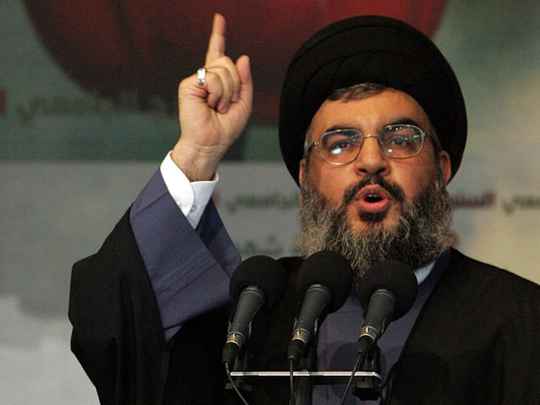
Trita Parsi, the president of the Washington DC-based National Iranian American Council and Paul R. Pillar, a Nonresident Senior Fellow at the Centre for Security Studies at Georgetown University, recently argued that clear signals existed that Israel may be at war with Hezbollah this summer. Is a new conflict inevitable in Lebanon or are there signs that Beirut could overcome significant internal and regional pressures?
Parsi and Pillar anticipated a war either as a spillover from the ongoing Syrian civil conflict or as a result of persistent Israeli-Hezbollah tensions. In their analysis, what could tip the balance may well be an “Israeli calculation that war will shift momentum in the US Congress decisively against the pending nuclear deal with Iran — a deal that critics say will increase Iran’s manoeuvrability in the region, including its support for Hezbollah”. That may indeed be the case, as the authors refer to several official Israeli declarations and leaks, which strengthen their argument. They quote a presumed Israeli military official telling the New York Times on May 12 that preparations were under way for the “inevitable next battle with Hezbollah”, promising to “hit [it] hard” when the war starts. In as much as Israel fears Hezbollah’s capacity to hurl nearly 1,200 rockets a day against it (although it is unclear how long such a tempo can be sustained), Parsi and Pillar take note of the party’s overextension in Syria, which may act as a deterrent for the relatively isolated group, reticent to embark on a new adventure.
What the two analysts argue, however, is that Israel will launch an attack on Hezbollah as a preventive military measure as recommended by Prime Minister Benjamin Netanyahu’s newly-appointed director general at the Israeli Foreign Ministry, Ambassador Dore Gold. From an Israeli perspective, such a confrontation would kill or severely handicap the putative agreement between world powers and Iran over the latter’s nuclear programme since, presumably, that would advance Israeli interests. While such a motivation would confirm that any confrontation with Hezbollah would add to Iran’s woes in the region, Lebanon will, once again, pay the unbearable price of having hostile residents and neighbours. Consequently, it was fair to ask whether Lebanese elites will have the wit to prevent a devastation that will make 2006 look like a picnic, even if one cannot be too optimistic.
In fact, recent Lebanese Cabinet discussions were so ferocious over security issues dealing with calls to deploy the army into and around the border town of Arsal, that many feared a new civil war. Several ministers, a title that must be used with caution in this country, issued strongly-worded statements that highlighted existential disagreements on how best to deal with Jabhat Al Nusra militants entrenched near Arsal. March 8 ministers perceived the zone as nothing more than extremist-occupied territory, which required the deployment of the army to eradicate them, even if the use of force against a largely Sunni town was likely to provoke members of that community. March 14 ministers cautioned against any hasty step for fear of sparking confrontations throughout the country. Health Minister Wael Abu Faour, from the Progressive Socialist Party that presented itself as a centrist group, warned that the Arsal dispute could be the spark for a new strife, much like the Ain Al Rummaneh bus incident that ignited the 1975-1990 Civil War that, presumably, everyone wished to avoid.
Hopelessly divided
Abu Faour used blunt language when he declared: “Hezbollah and the Future Movement must decide whether they want to take the country to the unknown, or to agree to prevent the situation in Syria from spilling over into Lebanon.” He did not make a reference to the Parsi/Pillar thesis that a southern front could be just as devastating, although that possibility was on everyone’s mind. In other words, what Abu Faour awaited was an agreement in principle among Lebanese parties to ward off a new civil war.
A few days ago, Hezbollah chief Hassan Nasrallah insisted that the Lebanese army enter Arsal once and for all to subdue its unruly inhabitants because, wait for it, the latter were aiding and abating the enemy. Short of that, Nasrallah hammered, Hezbollah would do it itself, ostensibly because the party could no longer tolerate the support Arsal inhabitants provided Syrian extremists who are finding refuge and support in the city and its surrounding areas. General Michel Aoun, the Hezbollah candidate for presidency, added his voice to this chorus, which anticipated a split of the institution if it did not fulfil his demands.
Both were of course aware that such a step might spark a civil war, though the assumption may well be that in 2015, Sunnis are unarmed and Christians are hopelessly divided. Consequently, Hezbollah may well reason that this is not 1975 and that the party could prevail, though such a calculation is probably mistaken since the will to resist all foes was still intact.
Dr Joseph A. Kechichian is the author of Iffat Al Thunayan: An Arabian Queen, London: Sussex Academic Press, 2015.







